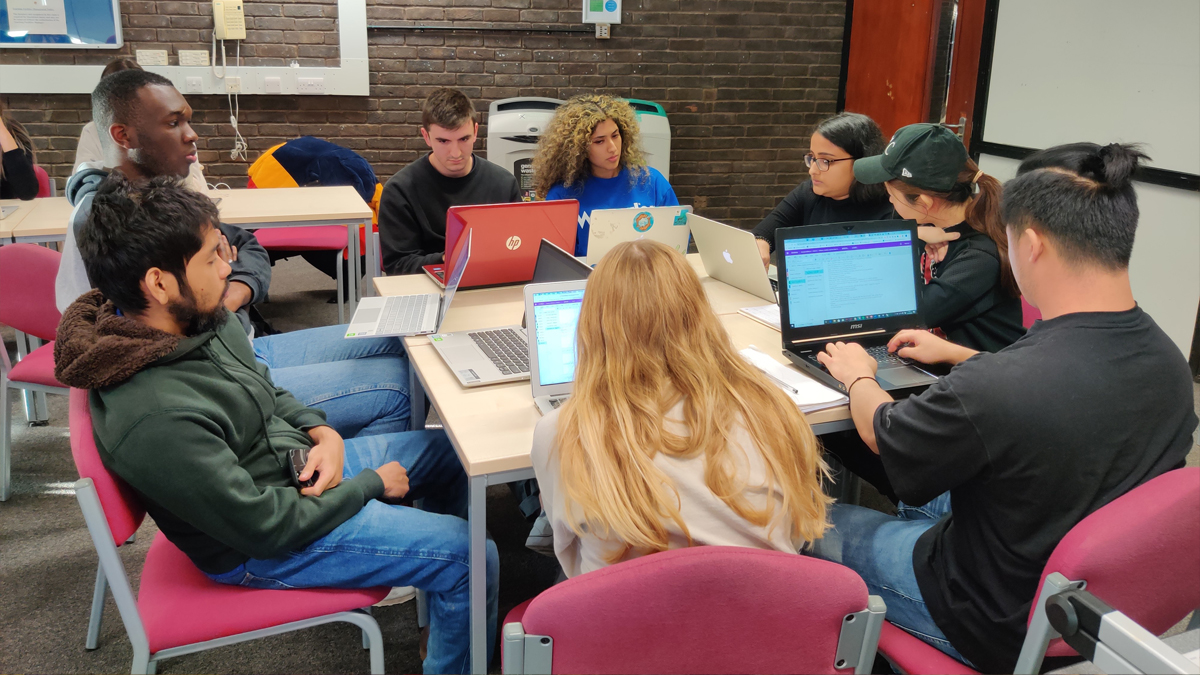
We aim to provide a well-rounded, thorough learning experience which gives you a solid foundation in law and legal practice. You will also acquire transferable skills that aim to prepare you for a range of other careers.
We aim to provide a well-rounded, thorough learning experience which gives you a solid foundation in law and legal practice. You will also acquire transferable skills that aim to prepare you for a range of other careers.

You will learn through a combination of lectures, small group tutorials, seminars and independent study sessions.
Staff use a variety of innovative teaching techniques to engage and motivate students, including research-led teaching, where you will explore the cutting-edge legal and policy issues in each area of law with our world-renowned academics.
Discuss the general principles and theoretical framework of a topic in large group lectures. You'll then explore the topics further through independent study.
Lectures are delivered by experts from the School and sometimes include sessions with a guest speaker.
You will attend small, informal, discussion-based tutorials. A set of questions will be shared in advance and you will be expected to prepare your answers and participate in open discussion with your peers and tutor.
You will also engage in small-group seminars. Taking place in a workshop format, you will be asked to read or watch material in advance to stimulate group dialogue.
To complement our academics’ expertise, we have hosted a variety of guest speakers.
Previous guest speakers have come from various universities around UK including Oxford, Cambridge and the LSE, and organisations such as Royal Navy and International Committee of the Red Cross.
You will receive strong academic and personal support throughout your degree to help you gain the most from your university experience.
We offer an induction programme, a dedicated Student Support Adviser, an excellent academic tutor system, and an established student peer support programme.
Assessment takes place through a range of methods, allowing you to demonstrate your strengths across different areas of academic study. Some of these include:
Engage with creative learning such as integrating drama that brings your law studies to life.
Drama is a powerful and collaborative method to learn about 'real-life' cases. Our students explored the Post Office Scandal in our latest play Glitch.
Engage with creative learning such as integrating drama that brings your law studies to life.
Drama is a powerful and collaborative method to learn about 'real-life' cases. Our students explored the Post Office Scandal in our latest play Glitch.
Alongside your academic study, we offer an enviable range of co-curricular activities to help you develop both personally and professionally.
Pro bono is the term used for the voluntary legal work which lawyers, and law students, undertake without payment.
Work with local charities and organisations, giving legal advice and support to real people with real problems.
Moots are mock legal hearings or trials. Mooting is where you take on the role of counsel and present arguments on a point of law.
Mooting requires research and analysis, the preparation of written submissions and an oral presentation.
Our dedicated programme provides you with opportunities to explore potential career paths, gain valuable practical insight, and strengthen your future job applications.
In the past, students have completed work experience with Thames Valley and City law firms (London), barristers, government agencies, not-for-profit organisations, and in-house legal counsel.
A work experience bursary is available to ensure placements are accessible to everyone.
We host regular events including workshops, employer visits, alumni conversations, and career talks, which feature practitioners from a range of fields discussing their work.
We also arrange employability and commercial awareness workshops where employers use practical activities with students to illustrate the legal work environment.
The annual Client Interviewing Competition aims to promote and develop the skills of law students through client interviewing in an educational context.
The competition is essentially a 'mock interview' role play involving a client whose legal needs must be identified and assessed.
The winners go on to represent the School of Law at the National Client Interviewing Competition.
The Negotiation Competition sets pairs of law students up against one another to negotiate a fictional scenario on behalf of their clients.
Students are judged on how well they work as a team, their communication skills, and the outcome that they negotiate for their clients.
The winners also go on to represent the School of Law at the National Negotiation Competition.
Boyes Turner, a local law firm, provide the training and sponsor the competition.
The ability to network is a necessary skill for virtually any job but for aspiring lawyers who have to make commercial contacts, gain new clients and impress existing clients it is vital.
Each year, a group of approximately 40 students from all year groups visits the Reading offices of Osborne Clarke to learn, from professional lawyers, key survival tips and tricks for networking.
Students then use their new skills to meet and talk to unknown members of staff at Osborne Clarke.
Litigation, the process of taking legal action, is not the only way to resolve disputes, another technique is mediation.
Students undertake commercial mediation training provided by BDBPitmans, where they take it in turns to mediate a variety of problems and role-play the parts of a variety of difficult and needy clients – just like real life.
A team of three students represents Reading in the national Mediation competition.

Second-year student Oscar Minto discusses the various opportunities available in the School of Law.
We encourage you to engage with the many opportunities offered by the Careers and Professional Development Centre, including:
The Careers Centre also organises the annual Law Careers Fair, which is exclusively for our students to attend.
Co-curricular activities are all the additional exercises that you are encouraged to participate in. They include pro bono work, mooting, negotiation, mediation, and client interviewing competitions. There are no costs involved for those students participating in competitions and co-curricular activities and enables you to:
Travel and exploration are not only incredible ways to complement your studies but also to help you grow and develop as an individual. We encourage all our students to visit other places, immerse themselves in different cultures, and to have memorable experiences during their degree.
Each year, with the very generous support of alumni donors, the European Law Students' Association (ELSA) organise and undertake a visit to a European city.
Students, accompanied by staff, visit key European institutions, for example, the European Parliament, the Council of the European Union and the European Commission.
Depending on your course, you could spend two weeks, a semester, or an academic year abroad. This can be part of a standard three-year degree, an extended four-year degree, or a shorter length of time such as a summer school.
We’ll help you decide where to go and for how long, guide you through the application process, and support you when you’re abroad.
To find out more about the benefits of studying abroad, and discover where you could go, visit the Study Abroad website.

Harpreet Dhatt
LLB Law with legal Studies in Europe - Universite Nancy, France
Develop your legal knowledge and skills in English law, while experiencing life in a different culture and legal system.
Our programme enables you to spend a full year abroad studying and is open to students by internal transfer who are on the three-year LLB.
If you wish to pursue a career in international law, business, human rights, or within an international or governmental organisation, or simply wish to travel and study as part of your law degree, this could be an excellent option to consider.

Study law at Reading and develop your legal knowledge and skills in a highly practical way, with plenty of opportunities to build real-life legal experience.


Learn in a friendly, inclusive law school where our practice-focused approach provides you with multiple opportunities to develop both personally and professionally.